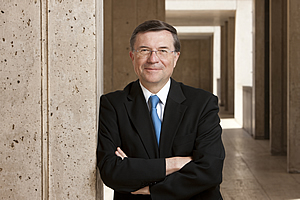
April 24, 2013
LA JOLLA, CA—Salk researcher Terrence J. Sejnowski,
professor and head of the Computational Neurobiology Laboratory, has been elected a Fellow of the American Academy of Arts and Sciences, a distinction awarded annually to global leaders in business, government, public affairs, the arts and popular culture as well as biomedical research.
Sejnowski is world renowned as a pioneer in the field of computational neuroscience and his work on neural networks helped spark the neural networks revolution in computing in the 1980s. His research has made important contributions to artificial and real neural network algorithms and applying signal processing models to neuroscience.

Terrence J. Sejnowski
Professor and Head of Computational Neurobiology Laboratory, Howard Hughes Medical Institute Investigator, Francis Crick Chair
Courtesy of the Salk Institute for Biological Studies
One of the key architects of the White House’s new BRAIN Initiative, Brain Research through Advancing Innovative Neurotechnologies, Sejnowski recently attended President Obama’s announcement of the bold new initiative. A 10-year research effort that will enlist the country’s top neuroscientists to map activity in the human brain, the goal is to invent and refine new technologies to understand the human brain in an effort to find better ways to treat such conditions as Alzheimer’s, autism, stroke and traumatic brain injuries.
“Terry is a remarkable scientist whose groundbreaking work has bridged computer science and neuroscience,” says Salk President William R. Brody. “Not only has his research initiated significant advances in neuroscience, it has inspired the research of generations of scientists. We congratulate Terry and commend the American Academy for honoring him with this award.”
Sejnowski is the 12th scientist from Salk to be inducted into the Academy and will share the honor with 198 new members of the 2013 class that include Nobel Prize winner Bruce A. Beutler, philanthropist David M. Rubenstein, astronaut John Glenn, actor Robert De Niro and singer-songwriter Bruce Springsteen.
The Academy selected Sejnowski and the other new Fellows as a result of their preeminent contributions to their disciplines and society at large. The honorees will be formally inducted into the Academy on October 12, 2013 at its headquarters in Cambridge, Massachusetts.
“Election to the Academy honors individual accomplishment and calls upon members to serve the public good,” said Academy President Leslie C. Berlowitz. “We look forward to drawing on the knowledge and expertise of these distinguished men and women to advance solutions to the pressing policy challenges of the day.”
One of the nation’s most prestigious honorary societies, the Academy is also a leading center for independent policy research. Members contribute to Academy publications and studies of science and technology policy, energy and global security, social policy and American institutions, and the humanities, arts, and education.
Since its founding in 1780, the Academy has elected leading “thinkers and doers” from each generation, including George Washington and Benjamin Franklin in the eighteenth century, Daniel Webster and Ralph Waldo Emerson in the nineteenth, and Albert Einstein and Winston Churchill in the twentieth. The current membership includes more than 250 Nobel laureates and more than 60 Pulitzer Prize winners.
About the Salk Institute for Biological Studies:
The Salk Institute for Biological Studies is one of the world’s preeminent basic research institutions, where internationally renowned faculty probe fundamental life science questions in a unique, collaborative, and creative environment. Focused both on discovery and on mentoring future generations of researchers, Salk scientists make groundbreaking contributions to our understanding of cancer, aging, Alzheimer’s, diabetes and infectious diseases by studying neuroscience, genetics, cell and plant biology, and related disciplines.
Faculty achievements have been recognized with numerous honors, including Nobel Prizes and memberships in the National Academy of Sciences. Founded in 1960 by polio vaccine pioneer Jonas Salk, M.D., the Institute is an independent nonprofit organization and architectural landmark.
Office of Communications
Tel: (858) 453-4100
press@salk.edu